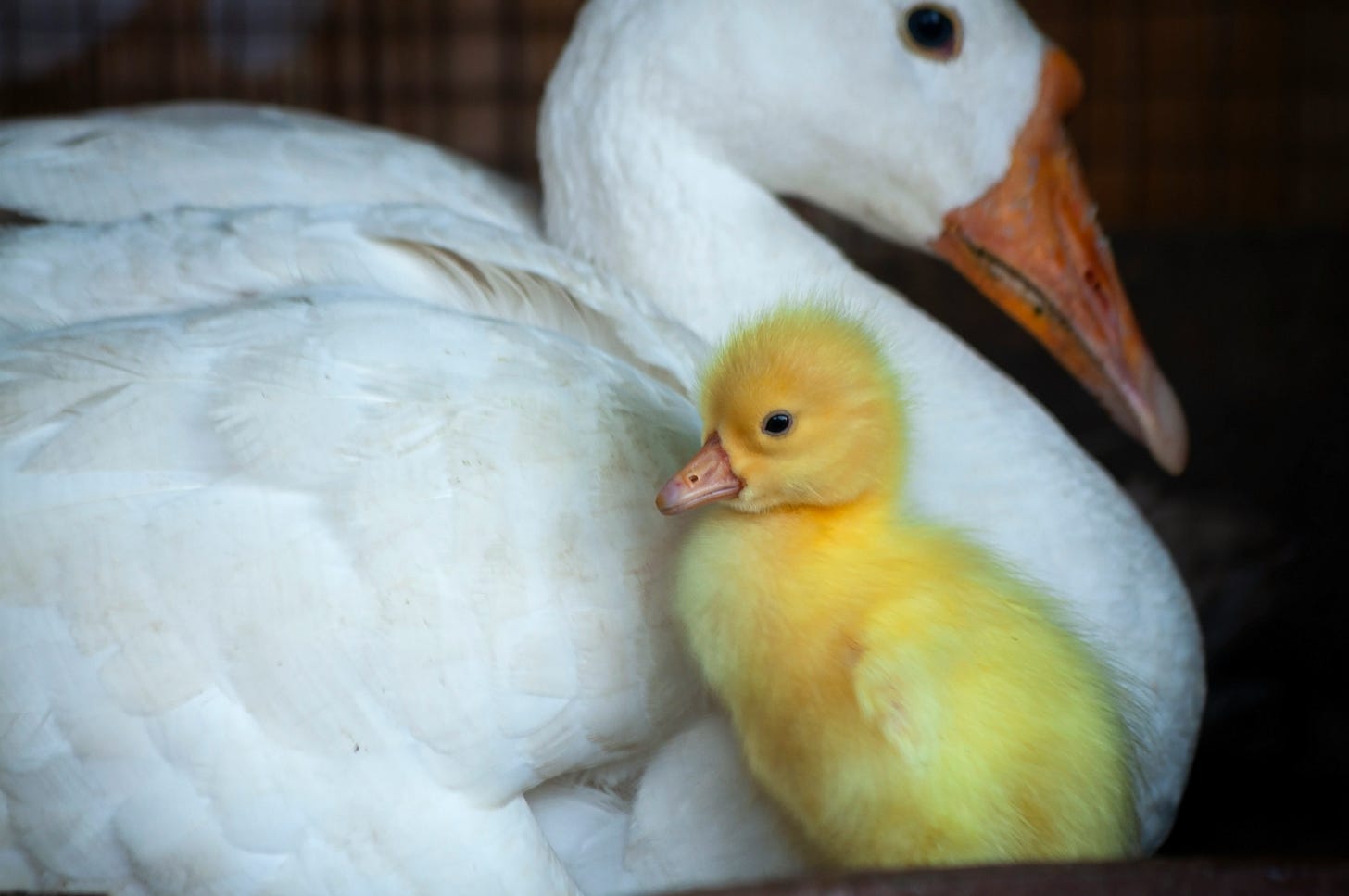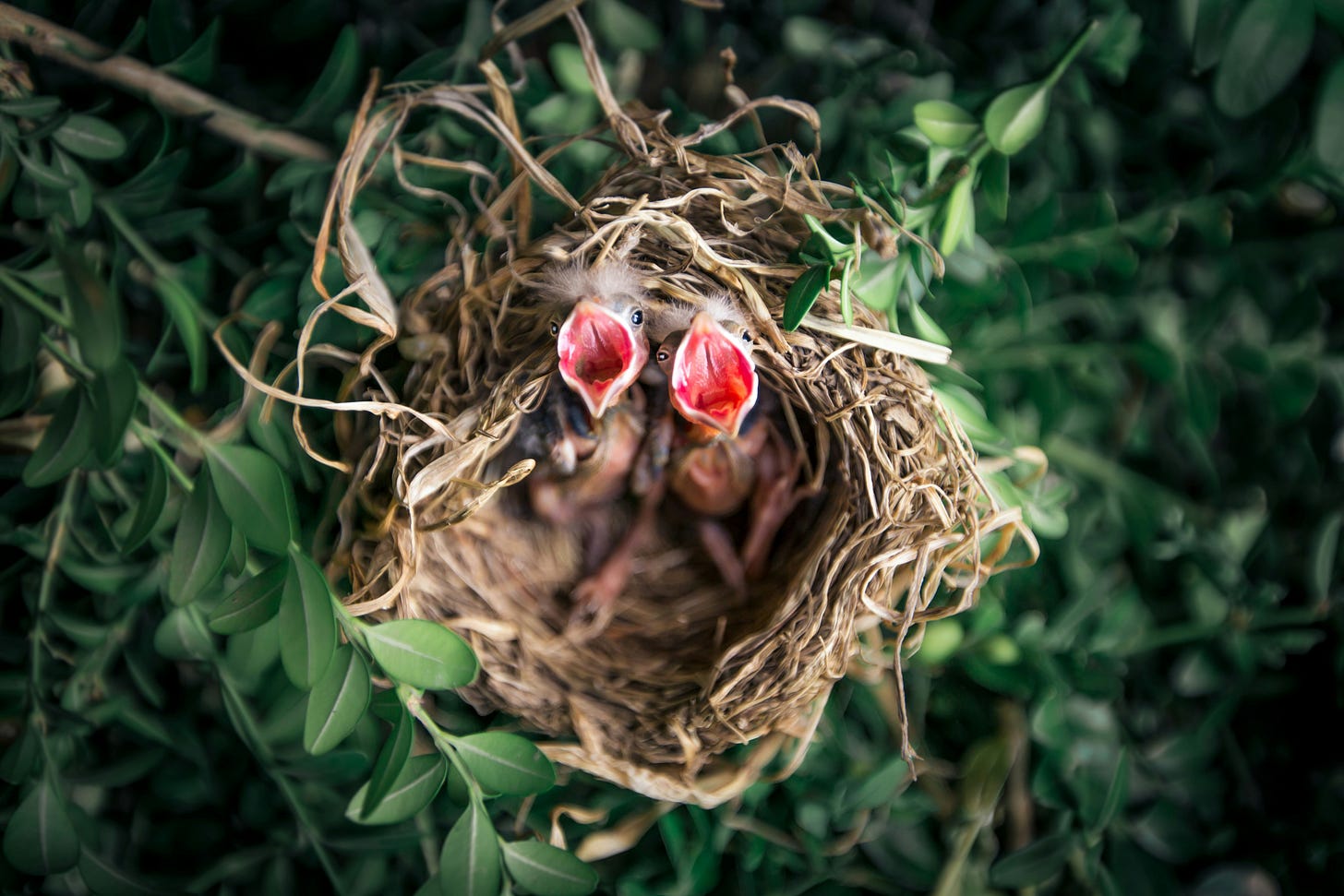Last year I began to introduce you to something known as ‘Self’ - the Brilliance Behind Everything. The concept of Self is one of my favourite parts of Internal Family Systems theory - an infinitely wise and loving energy inside us that is available to us (sometimes after a little work) regardless of our personal histories.
A quick way of recognising when Self is present is by identifying one of its eight qualities - curiosity, compassion, connectedness, courage, creativity, calm, confidence or clarity. We can also cultivate these different qualities as a way of increasing our access to Self. Last year we looked at the first four qualities of self - Curiosity, Clarity, Courage & Connectedness.
Today we’re starting the 2nd half of our series with compassion - and baby birds. 🐥

A story.
Many years ago I ran a writing retreat in France with Kaspa. We were just a small group in a big stately home with beautiful gardens. We designated one of the days as a day of silence, and so until mid-afternoon we asked our group not to speak to each other or to us.
When we came out of silence we had a listening circle where people could share their experiences. One of our participants cried as she spoke of something that had happened at lunch time. I can’t remember what she had been reaching for - the salt, the water jug? - but apparently I had noticed her need and passed her whatever it was, without any words. She had been deeply moved at receiving this kindness - at knowing that I was holding her needs in mind without her having to ask.
I was quite shocked to hear her say how much it had meant to her. A part of me wanted to take credit for this huge act of generosity that had landed so powerfully in her system. Alas, I could hardly even remember passing her the water jug. I had done it entirely without thinking - without any consciousness - and had proceeded without thought to filling my own plate with food.
This is the kind of compassion the great Buddhist teacher, Dogen, is alluding to in a famous story he tells. In the story he describes a hand that unthinkingly reaches out to move a pillow in the middle of the night. Maybe the hand is noticing someone else’s need and offering them the pillow, or maybe it’s our hand, noticing the need of our own body. There is no calculation involved - ‘this is what a good person would do’, or ‘if I do this I might get this in return’. It is a compassion that flows naturally from a noticing of someone else’s need or suffering, and it takes very little energy.
This is the great compassion of Self.

Some theory.
We all have parts that have the job of ‘being compassionate’. You might recognise them in yourself - getting activated by someone else’s pain and wanting to fix it for them, or stepping in when we feel guilty about something, or sticking close by when we perform a particular role at work or in a relationship.
These compassionate parts are doing a great job for good reasons, and they are very welcome in our systems.
They can, however, get us into trouble sometimes. If the compassionate acts are originating from our parts, and if our parts are over-working, these compassionate acts will deplete us and, after time, leave us empty and possibly resentful. They may be connected to an expectation that we receive something in return, and a disappointment or anger when we don’t. They may lead us to rescue others rather than supporting them to find their own way through.
These parts might also be trying to help us feel better about ourselves, in a way that is doomed to fail. If we hold a deep belief that we are worthless, then no amount of praise about how ‘good’ we are will convince that part of us otherwise. If we have a part that’s convinced we don’t deserve to receive, then even if we give and give and give, it will remain difficult for us to allow love in.
The compassion of Self is subtly but crucially different to the compassion of our parts. It flows from an unlimited source. It is entirely unselfconscious. It doesn’t differentiate between people that ‘deserve’ our compassion and those who don’t. It expects nothing in return. It aches with tenderness, but it never feels overwhelmed. It reaches across and rearranges the pillow, without thought.
Like all IFS theory, this is not a binary situation. We’re not *click* ‘in Self’ or *click* ‘in a part’. Instead there is always a mix of part and Self-energy. We say we’re ‘in Self’ when we have enough Self-energy around - much like being a good-enough parent. I don’t think that the Buddha or Jesus were 100% ‘in Self’. I say this to help you go easier on yourself - it helps me to check my own self-critical parts!
So how can we gently unlock more Self-led compassion for ourselves and for others?
Here’s what helps me to access more of the compassion of Self:
⭐ Notice what parts are present & listen to them
Our parts, especially when they are anxious or intense, get between us and the shining light of Self. The first step to helping them relax is noticing them and acknowledging them with kindness.
‘Oh, I’m really preoccupied with that conversation I had earlier - some parts must be agitated about it. Let’s take some time to listen to them.’ ‘Oh, I’m actually really angry about that news story I read. I wonder why it got to me so much?’
Parts want to be heard and understood. If we can do this, they’re more likely to relax back and bit and Self, including natural compassion, will fill in the gaps.
⭐ Validate whatever is going on inside you (& others)
There are always good reasons for us feeling the way we do, even if it seems a bit over the top or unreasonable. This goes for other people too. You might not always understand the reasons, but just imagining that there may be good ones can help unlock a little compassion for yourself and for others.
⭐ Put yourself into good compassion-cultivating conditions
If you feel kinder towards yourself and others after listening to particular podcasts or when you hang out with your cat or when you swim in the lake, do more of that! If you feel more upset with the world after chatting with that colleague who’s always upset about something, or forcing yourself to do things that aren’t really necessary, or scrolling on social media, do less of that!
⭐ If you’re low on compassion juice, begin with receiving
It’s difficult to access Self when our reserves our low. Most of us live in a world that is designed to tire us out - don’t underestimate systemic contributions to exhaustion and burnout, and don’t expect yourself to be immune. If you’re low on energy, then begin by offering yourself compassion. If you can’t manage that, ask someone to make you a cup of tea, or let the sun warm you for ten minutes, or just lie on the floor and feel the ground holding you up.
What else helps you to access Self-led compassion? Do let us know in the comments.
Little exercise
Spend five minutes in silence every day this week noticing your parts and bathing each of them in compassion as they appear. If that feels too complicated, just notice thoughts, feelings and sensations as they appear and send them love. ‘Little twinge in my knee, sending love. Thought about what I’m having for dinner, sending love. Vague sense of sadness, sending love.’ If it doesn’t feel good for any reason, just stop and do something else that does feel good instead.
Do let me know how your parts react to today’s piece, and do ask any questions in the comments. Next week - confidence!
Go gently,
Satya <3
When I was a child
I thought the sunlight
coming through the trees
was loving me.
After all these years
it still feels that way.~ Pir Elias Amidon








I hold a lot of compassion inside but get into trouble when as you put, “They may lead us to rescue others rather than supporting them to find their own way through.” How does one let go of the need to rescue and change it to support?
Bless you Satya for your loving words. I can feel they are written with great care and tenderness. I feel softer toward myself after reading them. Thank you xo